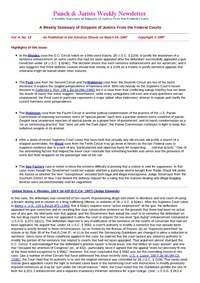Here the Court held that evidence of experts, rejecting a Government agent's statement that cocaine has a very strong order, was entitled to no credence.
Does cocaine smell? Well, in this case a U.S. Special Agent testified that generically "cocaine has a very strong odor." Because of that …
In this case the defendant falsely identified himself as his brother at a preliminary hearing in order to conceal his criminal record. He later pled guilty to a perjury charge and the underlying drug charge was dismissed. At sentencing the district court refused to sentence him under § 2J1.3(c)(1), …
Peck v. United States, 106 F.3d 450 (2nd Cir. 1997) (Judge Walker)
Waldemer v. United States, 106 F.3d 729 (7th Cir. 1996) (Per Curiam)
Both of these cases deal with substantially similar collateral appeals based on erroneous jury instructions and both base their findings on the Supreme Court's harmless-error …
[Editor's Note: See U.S.S.G. § 5K2.19, Post-Sentencing Rehabilitative Efforts (Policy Statement), which became effective on Nov. 1, 2000, and which made post-sentencing rehabilitative efforts, "even if exceptional," a probibited factor for downward departures.].
Here the Court held that extraordinary post-sentencing rehabilitation can constitute a proper grounds for departure …
Here the court relied on a little-used statute, 28 U.S.C. § 2106, to justify the imposition of a sentence enhancement on some counts that had not been appealed after the defendant successfully appealed a gun conviction under 18 U.S.C. § 924(c).
In this case, the defendant was convicted …
QUOTE OF THE WEEK - One view of the inexorable expansion of Federal regulation over everything.
"The Congress has had a recent penchant for passing a federal criminal statute on any well-publicized criminal activity. The courts, in an obeisant deference to the legislative branch, have stretched the Commerce Clause …
Here the court reversed a major bank fraud conviction because the trial court refused to grant a mid-trial severance to a defendant after evidence of a co-defendant's contempt conviction had been introduced to the jury.
Anytime a major bank fraud conviction is vacated on appeal, the case is …
It is really rather amazing that the autocratic United States Parole Commission is still around. When the Sentencing Reform Act was first passed and parole was replaced by supervised release, the Parole Commission was supposed to be phased out within five years. Later it got an extension of its …
This case may go down in history as the last Federal case to suppress evidence seized during a warrantless search of an automobile due to a lack of any "particularized and objective basis for suspecting . . . criminal activity".
With the advent of a plethora of recent …
One of the issues raised in this case was the constitutional validity of the so-called "Schoolyard Statute" (21 U.S.C. § 860(a)) which provides that if a defendant is convicted of committing a drug crime "within one thousand feet of the real property comprising a public or private elementary . …
This case explores in depth two issues: whether the defendants were entitled to a change of venue and whether the criminal statutes involved (principally 18 U.S.C. § 2512, which prohibits the manufacture and distribution of illegal bugging and wiretapping devices) were void for vagueness. On the venue issue, the …
See also U.S. v. Cleveland, 106 F.3d 1056 (1st Cir. 1997).
In this case, the defendant, a bailiff working for the local Sheriff's office, pled guilty to knowingly using and carrying a firearm in relation to a drug trafficking offense. After the Bailey decision, he filed a motion to …
In this case, after the trial court had ruled that the Government would be allowed to introduce evidence of the defendant's prior conviction if he chose to testify. In order to anticipate the Government's introduction of that evidence and take the "sting" out of it in the eyes of …
Peck v. United States, 106 F.3d 450 (2nd Cir. 1997) (Judge Walker)
Waldemer v. United States, 106 F.3d 729 (7th Cir. 1996) (Per Curiam)
Both of these cases deal with substantially similar collateral appeals based on erroneous jury instructions and both base their findings on the Supreme Court's harmless-error …
Peck v. United States, 106 F.3d 450 (2nd Cir. 1997) (Judge Walker)
Waldemer v. United States, 106 F.3d 729 (7th Cir. 1996) (Per Curiam)
Both of these cases deal with substantially similar collateral appeals based on erroneous jury instructions and both base their findings on the Supreme Court's harmless-error …
Case held that under the "law of the case doctrine" a court is generally precluded from reconsidering an issue that has already been decided by the same court or by a higher court in the identical case (Id., at 876).
In the case the court also held that …
